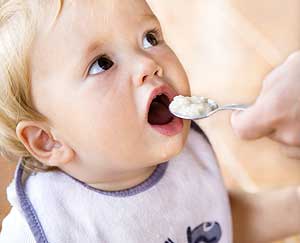Penn Herb Wellness Guide
Boost Babies’ Iron for Healthier Adulthood

Iron for life
Iron is a mineral used to make a component of red blood cells that transports oxygen to various tissues and organs (hemoglobin), and an oxygen-storing compound in muscles (myoglobin). Iron is also necessary for a healthy immune system, digestion, and hair and nail growth.
Deficiency can lead to anemia, a condition characterized by fatigue, shortness of breath, decreased appetite, and weakness. Iron status influences nervous system development and studies have linked early iron deficiency to alterations in cognitive function and behavior.
A window of opportunity
The study looked at adult outcomes of early iron deficiency by comparing 33 adults with a history of chronic iron deficiency as babies with 89 who had had normal iron levels. Here’s what the results showed:
- Adults who had been chronically iron deficient as babies were significantly less likely to finish secondary school or pursue advanced degrees as their iron-sufficient counterparts.
- Adults who had been iron deficient reported poorer emotional health, including feelings of dissociation and detachment.
- More than 80% of the iron deficient group was single at age 25, compared with only 24% of the iron sufficient group.
- Physical health and employment status didn’t differ between the groups.
Previous studies have found that it’s hard to make up for the losses that occur from early iron deficiency. The new study added some hope, noting that adult outcomes were good in people whose iron levels were corrected early on.
“This finding suggests that poor long-term outcomes, at least on measures of overall functioning, may be prevented if iron treatment is provided before iron deficiency becomes chronic and severe,” said lead author, Betsy Lozoff from the Center for Human Growth and Development and Department of Pediatrics and Communicable Diseases, University of Michigan, Ann Arbor.
How much iron does Baby need?
Due to their rapid growth, infants and toddlers require more iron.
- Babies are born with enough stores to last the first four months of life; after that, iron has to be supplied through the diet.
- As milk inhibits iron absorption and milk often replaces other foods which may have provided iron, children introduced to cow’s milk before one year are at higher risk for iron deficiency.
- Most babies need 8 to 10 mg of iron per day. Breast-fed babies may need less, as the iron in breast milk is highly absorbable. Breast-feeding women who develop iron deficiency should take an iron supplement.
- All babies (breast- or formula fed) should be given iron-rich or iron-fortified foods starting at about six months.
- Eating iron-rich foods like beans, red meat, seafood, dried fruits, and leafy veggies (like kale, collard, and spinach) with a vitamin C source, like orange juice, cantaloupe, strawberries, red peppers, or broccoli, can boost iron absorption.
(J Pediatr 2013;163:1260-6)
Copyright 2025 TraceGains, Inc. All rights reserved.


